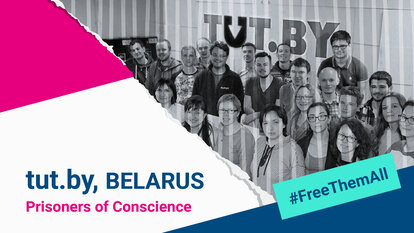Human Rights
Prisoners of Conscience: Tut.by, Belarus

Belarusian authorities forced a flight from Greece to Lithuania to make an unplanned landing in the capital of Minsk because of an alleged bomb threat on May 23, 2021. Later, it turned out that the surprising detour was part of a sinister plot to detain Roman Protasevich, a Belarusian blogger and a former editor-in-chief of Nexta, a popular opposition channel on the Telegram messaging app.
While diverting this plane made front page headlines globally, the many attempts to repress media freedom in Belarus remain unnoticed. Just several days before the incident, local police raided the headquarters of the independent news site Tut.by in Minsk and several other of their offices across the country. The same month, 15 of its employees were detained and interrogated, including the editor-in-chief Maryna Zolatava, business reporter Elena Tolkacheva, political editor Volha Loika, and social media editors Maksim Pushkin and Ala Burkouskaya.
At the time of the raids many Tut.by employees could not be reached by phone and were later forced to sign non-disclosure agreements.
The homes of several of the publication’s journalists were also searched and Belarusian media reported that the police also confiscated some equipment, including electronic devices which were not in use. Later the detained Tut.by employees, including some lawyers and accountants, were charged with evasion of "payment of taxes and fees on an especially large scale."
Belarusian authorities took Tut.by website offline for a time and in the fall of 2021 suspended its license for three months.
Human rights organizations and media watchdogs condemned the arrests, calling for the Belarusian authorities to immediately free the detained journalists.
“Since at least two government entities cited different reasons for raiding and blocking Tut.by and detaining its journalists, it’s clear that the authorities’ only real motive is to censor Belarus’ premier independent news website because they fear its reporting,” said Gulnoza Said, Europe and Central Asia programme coordinator at the Committee to Protect Journalists, in May 2020. “Authorities must release all Tut.by employees immediately and without charge and should allow the outlet to work freely.”
In July, a Belarusian court confirmed an earlier decision that described some of the articles published by Tut.by as “extremist”.
Tut.by is not the only Belarusian publication which have been persecuted by Alexander Lukashenko, the long-serving president of the country whose authoritative measures are condemned by the international community. In May 2021, Belarusian police stormed the Minsk studio of Belsat, a television station, based in Poland, which is critical of Lukashenko and his regime, and arrested six journalists. In the summer of 2021 police raided the office of the independent news website Nasha Niva as well as the apartments of several of its editors under suspicion that they had been organizing “mass riots”.
Media freedom in the country has been in decline, as Lukashenko started cracking down on independent media outlets and other critics of his regime by detaining dozens of reporters, just as he tried to censor coverage of the mass protests in 2020. Reporters Without Borders’ Press Freedom Index described Belarus as “the most dangerous country in Europe for media personnel”.

Disclaimer: As of December 10, 2021 Tut.by staff members remain in custody.

Prisoners of Conscience from East and Southeast Europe
We feature select few prisoners of conscience out of the many in East and Southeast Europe. One political prisoner is one too many.
Find out who the other political prisoners are #PrisonersofConscience #FreeThemAll and in the special Focus on our website.